- Home
- Joseph Bruchac
Two Roads Page 2
Two Roads Read online
Page 2
I could spout that out now—but I’ve said all I intend to say.
Red laughs, loud and deep as thunder. He leans down to slap me on my back in a friendly fashion that nearly dislocates my shoulder. The grin on his face is wide as Jack’s Old Lantern.
“Wood splitting it is,” he says. “And tell Rose to give this eth-ee-cal son of your’n the slab of corn bread she was savin’ for me.”
He slides his shotgun into the sheath hung from his saddle, kicks his heels into the big horse’s sides, and they gallop off, dry red dust rising from the road behind them.
CHAPTER
TWO
NOT ALL THAT MUCH
There’s not all that much wood to split and stack. No more than a cord. But Red’s wife, Rose, as big-boned as her husband, makes like we got enough done to heat their cabin and stoke the cookstove for a year.
“Come on in now, boys,” she says.
I finish washing at the pump. Then I take out my comb and run it through my hair a dozen times. Just to make sure my hair’s not tangled, but slicked neatly back.
“Ready?” Pop says.
I nod and we follow the sweet aroma of home-cooking inside.
I’m served a big slab of corn bread. I eat it slow, sopping up the gravy from the squirrel stew she spooned into tin plates for each of us.
“Thank you kindly, ma’am.”
Those are the only words out of my mouth the whole meal. But they are sufficient to earn me a second piece of corn bread.
Try to Be a Gentleman at All Times.
That is part of the second rule of the ethical code. I do my best to live by it.
The sun is a few fingers past the top of the sky when we finish eating.
There is no time for us to boil up. But rinsing and wringing out our shirts at the pump renders us presentable enough for polite company. The sun is warm enough to dry our shirts as we walk.
“Off we go, Cal,” Pop says, shouldering his bindle.
I nod and we start off.
Pop is just tireless when we walk together. Miles fall away under our marching feet. It is still two hands from sunset when we come in sight of Pop’s destination. It’s a small farmstead. It’s not within Rustburg proper, but at the outskirts of the little town where there’s mostly fields and farms.
Pop stops at the rail fence a hundred yards from the house. Between the house and fence is a field of cotton. White plumed stalks wave at us like little hands as a wind comes up.
Pop is shaking his head. He’s studying three hobo signs scratched into the corner post. They are no more than a foot from the ground. Not where a member of John Q. Public would look.
The first sign, older by the way it’s weathered, is a square missing its top line. It’s the sort of sign a hobo loves to see. It means this is a safe place to stop for the night.
But the second two signs, more recent, are ominous.
The first of those newer symbols is a square with a slanted roof and an X drawn through it. The second is a triangle with two raised hands.
“Dang and blast,” Pop says. It’s as near to cussing as he ever gets.
I nod and look back down the road. Time for us to start padding the hoof.
Pop shakes his head.
“Nope, Cal,” he says. “Let’s see if we can set this right. You stay back of me.”
We walk up the driveway that leads to the small farmhouse. It has a single story. No more than four rooms by my estimate. I do as Pop says. I stay back, but not too far. If someone suddenly comes out that door with a gun, my plan is to push Pop aside and try to duck the shot. With that bad leg of his he can’t always move that fast.
I take care of you, you take care of me.
As we walk, I am thinking about those signs we saw. I am feeling perturbed about whoever the tramp was who did the homeowner wrong. This is a person who was friendly to ’boes before, but now is no longer open to honest men of the road such as us. That second sign, the one of a house with an X through it—meant that hoboes were no longer welcome. The third one, that triangle with the two hands on it, that was even worse. It meant a homeowner with a gun!
Had the one who turned this place unfriendly been a thief? It was surely no real ’bo. Us honest to Pete hoboes follow the code and work for what we get. More likely it was a tramp, someone too lazy to work and apt to steal your boots while you was sleeping.
We’re now within sight of the front door. So far there’s been no barking from a dog and no shout of “Clear out, Bums!” from anyone inside. That’s good—unless they’re waiting for us to come close enough to get a better shot at us.
The screen door opens just a crack. But that crack is plenty big enough for what appears to be the barrel of a rifle shoved through it.
“Mauser,” Pop says, his voice soft. “Saw too many of them pointing at me in France.” He reaches a hand back to stop me from doing anything. “Stay back, Cal.”
I should do something. But what?
“Go away, you two! You got no business here. Go on now before I shoot you!”
The only good thing about what was just shouted at us, in a woman’s high voice, is that what we heard was words and not the crack of a German rifle.
“Edith,” Pop calls out. “That you in there?”
The barrel on the gun drops. I catch a glimpse of a face peering out above it.
“Who are you to know my name?” the woman says. Her voice is more quizzical than challenging now.
“It’s Railroad Will,” Pop says, his voice turns singsong, “Child of the Open Road, Heir to the Throne of the Wind, the same Son of the Soil who served by the side of your husband, Sam, in the War to End All Wars.”
“Will Black!”
The door swings wide open and a woman comes running out. She throws her arms around Pop, almost braining me with that rifle still in her right hand.
Pop carefully extricates the rifle from her grasp without removing her arms from around his neck. He hands the gun to me. I hold it carefully, parade rest.
“Edith,” he says, her feet not touching the ground as she hangs about his neck like some sort of scarf, “you are looking well.”
The Edith-woman leaves go of her hold, plops down onto her own feet, and reaches up her left hand to push a thick lock of brown hair back over her forehead.
“Why thank you, Will Black,” she says.
“I just speak the truth,” Pop replies.
They stand there a moment. It makes me feel awkward. It’s as if there’s something between them that goes back a ways, something they don’t seem to need to talk about because both of them know it so well.
“And who is this?” the Edith lady says, suddenly turning her eyes on me.
Pop swings his chin my way, the gesture he does instead of pointing a finger the way most do.
“Meet my boy, Cal,” he says. “The finest companion any traveling man could hope to have by his side.”
It makes me proud to hear Pop say that, his voice so sincere. I stand a little straighter, swing the rifle from parade rest up to shoulder arms, and snap a salute with my right hand.
“Yes, sir,” I say.
That brings a grin to Pop’s face and an outright laugh from Edith. It’s a pleased laugh, not her laughing at me.
“Well,” she says, “and who taught him that?”
“Give Mrs. Euler back her gun,” Pop says in reply.
I try to hand her the gun, but she shakes her head.
“No,” she says, smiling at me. “You bring it on in with you. It is not loaded, anyway.”
“I know, ma’am,” I say, opening it to show the lack of any shells in its breech.
That broadens the smile which seems to be a natural expression on her face.
“Come on in.” She gestures at the door. “There’s a chicken stew on the stove an
d a mince pie in the oven, as well. More than a widow woman can eat by herself.”
As we sit at her kitchen table she small talks about her little farm. How the hired man who comes by three days a week is a good enough worker. How the chickens, Sam’s Plymouth Rocks, have been laying their eggs good and regular. How that big field of cotton is leased out to a man she calls the Colonel, who pays her a fair enough price for the use of the sixty acres.
Pop listens, nodding his head now. He is paying careful attention to her words, as if his life depended on them. Whenever she seems about to falter or lifts a nervous hand to push back that thick brown lock of her hair, he speaks a word or two of encouragement.
Yes. Go on. I see.
That is one of the things I admire about Pop. He has a way of paying attention that makes people feel good about themselves. I am not sure where he learned that, but it is something I intend to emulate whenever I have the opportunity. There is nothing fake about it. He’s not just pretending to be interested, even in things that might seem boring. He just finds people interesting.
Finally, Miz Euler reaches a point where her words finally run out, like a pot from which the last drop has been poured. Like the actual empty coffeepot from which she has poured no fewer than four cups for Pop over the last hour.
She takes a breath, looks around the kitchen, sighs.
“Time I set the table. You two go wash up,” she says.
As I reach for the pump handle, Pop holds out a hand to stop me.
“Sam Euler,” he says. He’s looking over his shoulder toward the house.
I wait, knowing there’s more about to be said. But instead of speaking, he just points with his chin over by the woods behind the house. I see right away what is there.
We walk over to it together. It’s a rough-cut rock, not the smoothed granite you seen on rich folks’ resting places.
“Local sandstone,” Pop says, squatting down as best he can with that stiff leg. “Cut it himself, carved in his name and the dates when he knew he was about out of time.”
SAMSON K. EULER
1898–1928
S.K.E., I think. A shiver goes down my back. Those were the initials on the watch I saw in my vision. Pop has a gold watch like that one.
“It was the gas,” Pop says. “Sam had only half a lung left when he got back. It was a near miracle he survived as long as he did. Long enough to set this place up, pay off the mortgage. Then he could let go.”
I reach out my hand to help Pop up. He could do it alone, but then again as he often says, there are plenty of things a man can do alone, but do a sight better with just a little help.
“Never met a man stronger than Sam. That Biblical name surely suited him. It was him who carried me over one shoulder back to the trench, running, leaping over the shell holes and the bodies of fallen men, right through the barbed wire, paying no heed to bullets and shells. I would have been pushing up poppies in Flanders were it not for Sam.”
We walk back to the pump. Cool, sweet water comes gushing out as I lift the creaking handle up and down, up and down. But Pop just stands there.
He has that faraway look on his face again. He doesn’t like to talk about the Great War. It’s too painful for him. Maybe feeling that pain of his is what makes me imagine I was there with him. Though that vision of the gold watch is still bothering me. I imagine it could just be coincidence. But what about the part of my vision when I see Sam picking Pop up and carrying him to safety?
There’s no explaining that. No question I could ask about it. But I know I should say something now to bring him back.
“Pop?”
“Yes, Cal?”
“You saved him, too, didn’t you?”
“You could say that,” he replies.
Pop sticks his whole head under the gushing spout. He’s done talking. He wipes his face with both hands and slicks back his thick black hair. Then he shakes the water from his hands, making dark spots on the dry red earth to the side of the trough, as if he’s offering the ground some of that water.
“Your turn,” he says, taking the pump handle.
I bend and wash my face and hands as he did, sluicing away not only the dirt, but also as much as I can of a memory of pain and loss—a memory I’ve somehow shared.
We’re back at the table again. The two of us are scrubbed to the point where our faces are nearly as red as apples, our fingernails as clean of the usual dirt as the points of our jackknives can make them. Pop is not talking. He’s looking, just as I am, at the big bowl of chicken stew that Miz Euler just placed in the center of the table. The steam rising up from it carries an aroma that makes my mouth water.
But I have to wait. My father and I are civilized travelers of the highways and byways and not lowlife scroungers. Grace comes first.
Miz Euler and Pop are each waiting for the other to say the words. But neither seems ready to pipe up with a blessing or pass the burden of saying grace to the other.
“Go ahead,” Miz Euler finally smiles.
“Creator,” Pop says, his voice deep and resonant, “we three who have gathered here give thanks for this food, this gift. We thank the bird that gave its life, the plants that also allowed themselves to be sacrificed to feed us.”
Pop pauses, takes a breath.
“We are thankful for the good company around this table and for the everlasting love that still echoes through this home, the love of a good man and a good woman. We are thankful for the brief time we will shelter here in this blessed place before we set our feet again to that long path you’ve placed before us to travel.”
Again he pauses. Though I do not look up, my eyes glued to my bowl as he speaks, I can hear a soft drawing in of breath from Miz Euler and I am pretty sure there’s a tear or two in her eye.
“Amen,” Pop says.
“Amen,” we say.
I am halfway through my second bowl when I feel something wrapping itself around my leg. I don’t jump, except in my mind.
The last time I felt something like this was at a jungle camp near the railhead at the outskirts of Tucson, Arizona. Two months ago, it was, Pop and me having ridden the rails south to escape the harshness of a northern winter by seeking that balmier clime.
A feeling like a long hand pressing on my ankle, moving around, up, tightening. And then a soft hiss.
“Don’t move, son,” Pop’s voice whispered. “I heard it.”
I opened my eyes to look down, lifting my head only a hair. All I saw at first was Pop’s shadowed figure crouching, outlined by the low glow of the campfire behind him. Then he struck a match.
And chuckled at what the light disclosed.
It was a snake all right. A big one. But even in the small amount of light cast by the lucifer we could see its smooth tail and the shape of its head. It was not a rattler.
“Bull snake,” Pop said, his hands gently uncoiling it from around my calf. “Come to warm itself up some.”
It wrapped around his arm, its head raised to look at him as he lifted it. It was a good six feet long, thick bodied and black as jet. Its eyes caught a gleam from the fire that made it seem as if they were filled with stars.
I reached out a hand and stroked the big bull snake’s back. It hissed again, a sound I took as approval.
For some reason, Pop and me always have gotten along with snakes. Most fear them, to the point of hysteria. But, as Pop says, snakes just want to go their own way. Though, to be honest, I would far prefer that their way not lead into my bedroll.
Pop placed the bull snake on a blanket off to the side, a spot where the fire’s warmth would be felt.
“You keep watch,” he said to it. “We give you heat, you keep us safe.”
Then the two of us settled back down and slept the night. One thing about bull snakes is that they tend to discourage rattlesnakes from coming around. N
ot that Pop nor I feared rattlers all that much. Rattlers are an honorable sort of snake, generally warning you before they strike. But a bite from a poisonous serpent that responds after being stepped on—or rolled over onto by accident—is just as bad.
This time, though, what’s wrapping itself around my leg feels different, especially when I hear a sound that tells me the one paying attention to me is no snake.
“Mrrroooww.”
“Rudy!” Miz Euler says. “You stop that!”
She reaches down under the table and pulls a fat, purring tabby up onto her lap.
“No manners,” she says. “But I spoil him. Typical widow woman with her cats.”
Rudy glances at Pop and then me, a self-satisfied look on its broad face.
“Twenty-three pounds,” Miz Euler says. “About breaks my back to lug him about. Doesn’t it, you rascal?”
Dinner is now finished, including a sweet-tasting mince pie. Pop leans forward to look toward Miz Euler’s back. There’s a quizzical look on his face.
“Will Black,” she says, “what are you staring at?”
Pop shakes his head. “That pie was so heavenly,” he says, “I thought for sure it had to be prepared by an angel. I was just looking for your wings.”
Miz Euler laughs out loud and Pop and I join in the laughing. That sort of gentle joshing is typical of my father. It is one of the reasons why those who know him are always glad to see him appear.
Miz Euler rubs her face with her apron. “It feels good to laugh again,” she says. “I am right glad that you and your boy stopped by, Will. You know Sam never stopped talking about you.”
Pop looks down at his hands.
“I wish I could have seen him more often, but . . .” he pauses a moment before speaking the words I’ve heard him say a hundred times or more “. . . we never know where life is going to take us.”
“True enough,” Miz Euler agrees.
“You been having some trouble with tramps?” Pop asks, saying that last word as if it brings a bad taste in his mouth.
“Indeed I have,” she says. “But how’d you know that, Will?”

 Peacemaker
Peacemaker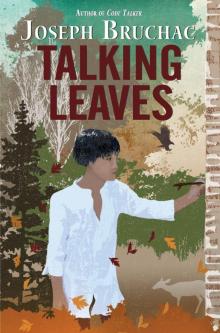 Talking Leaves
Talking Leaves Found
Found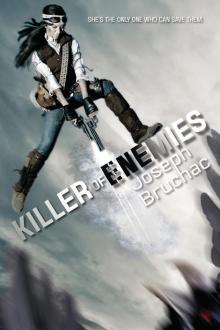 Killer of Enemies
Killer of Enemies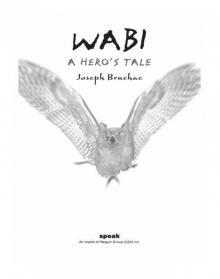 Wabi
Wabi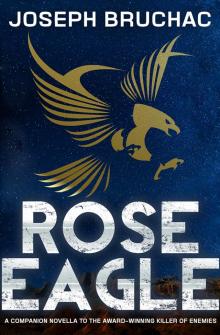 Rose Eagle
Rose Eagle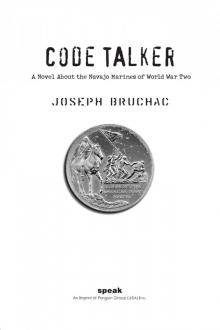 Code Talker
Code Talker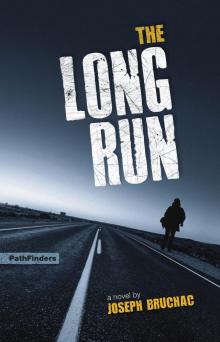 The Long Run
The Long Run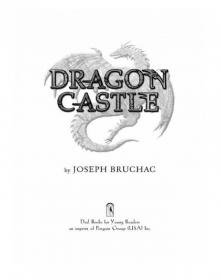 Dragon Castle
Dragon Castle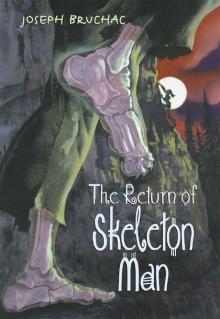 The Return of Skeleton Man
The Return of Skeleton Man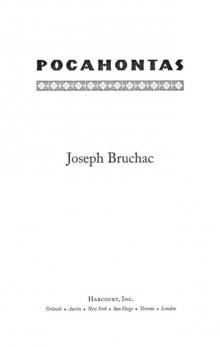 Pocahontas
Pocahontas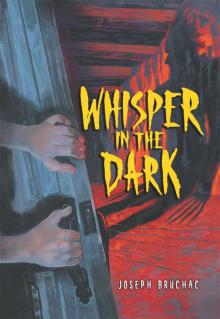 Whisper in the Dark
Whisper in the Dark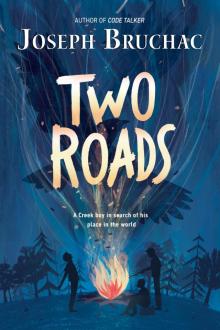 Two Roads
Two Roads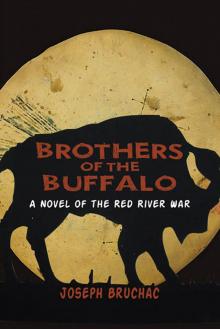 Brothers of the Buffalo
Brothers of the Buffalo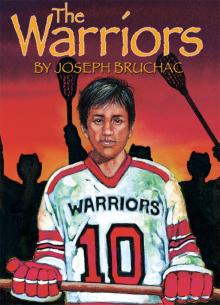 The Warriors
The Warriors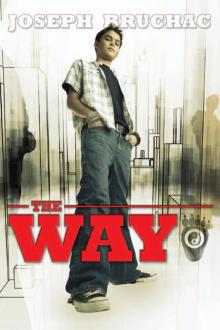 The Way
The Way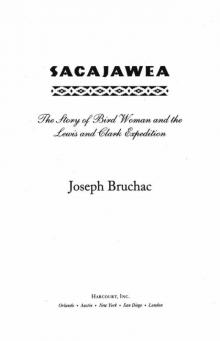 Sacajawea
Sacajawea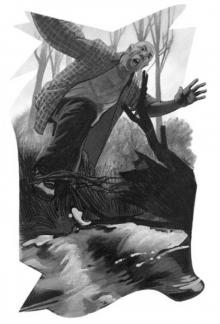 Night Wings
Night Wings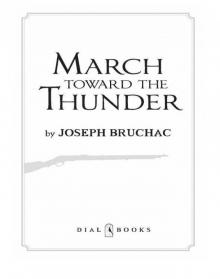 March Toward the Thunder
March Toward the Thunder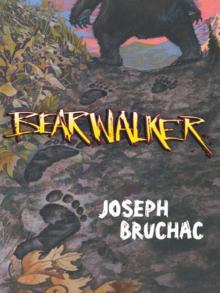 Bearwalker
Bearwalker Skeleton Man
Skeleton Man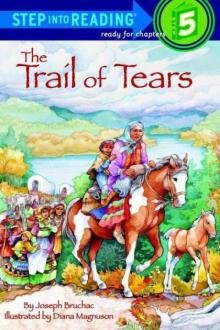 The Trail of Tears
The Trail of Tears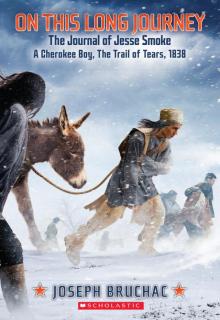 On This Long Journey
On This Long Journey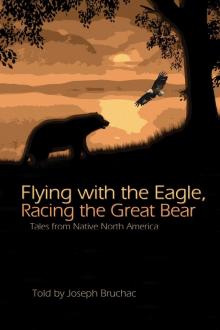 Flying with the Eagle, Racing the Great Bear
Flying with the Eagle, Racing the Great Bear